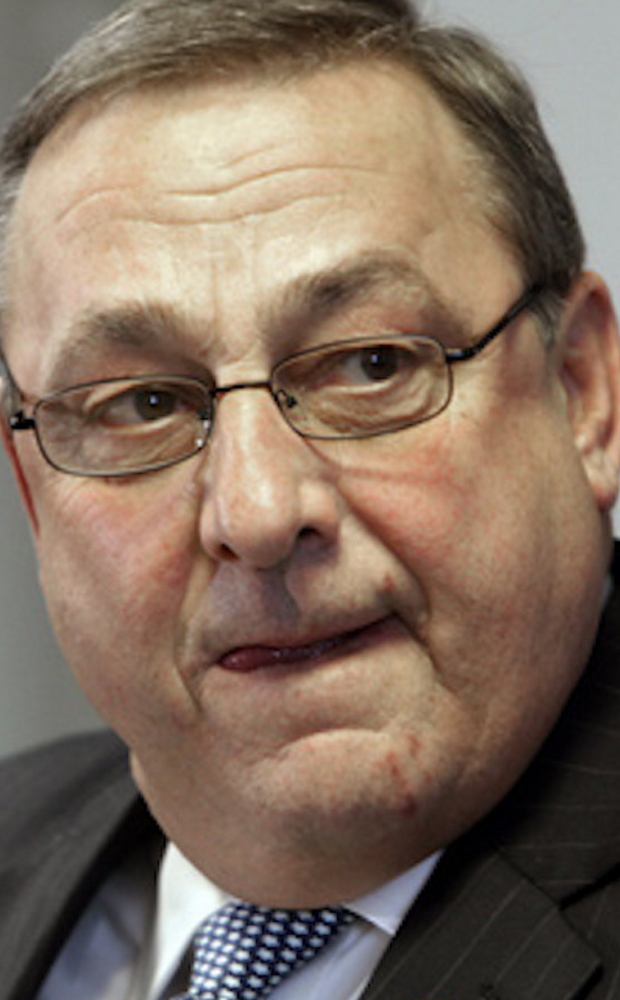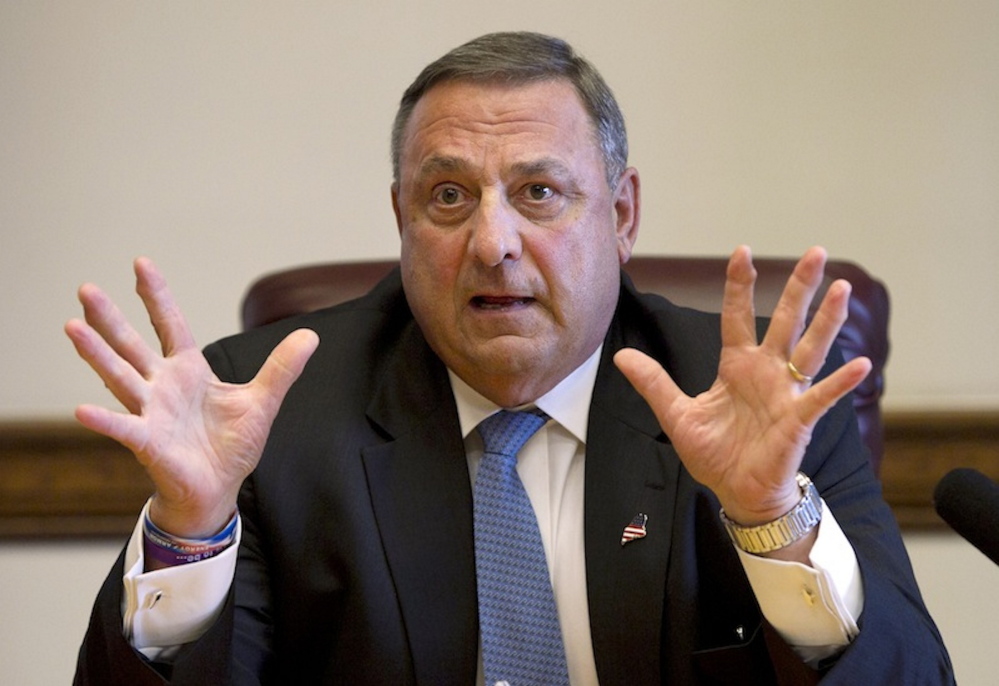AUGUSTA — Gov. Paul LePage made an impassioned argument Tuesday for his repeat bid to ratchet up drug enforcement efforts, labeling Democratic lawmakers as weak on the issue and telling reporters to send dissenting Republicans to his office so he can “rip ’em a new one.”
The governor’s initiative is his second attempt in two years to increase funding for additional agents for the Maine Drug Enforcement Agency, drug prosecutors and judges. The proposal, which is included in his two-year budget, would cost roughly $4 million annually and is a slightly scaled back version of the one he introduced last year.
Lawmakers passed a compromise version of the 2014 bill and added money for drug treatment programs, but the proposal was never funded.
LePage frequently recalled that defeat during his news conference Tuesday at the State House, laying the blame for Maine’s drug problem squarely on the lawmakers he’s urging to pass his latest proposal.
“If you’re not angry, you should be,” he said. “You should be disgusted at the behavior of some of these legislators that want to continue to ignore the killing of our children. They are weak on drugs. They simply don’t want to deal with the problem.”
He added, “The gloves are off now. These people need to do their jobs.”
Democrats said Tuesday that they agree with the governor’s concern about the state’s drug problem. However, they argued that the administration had not been persuasive with its enforcement-heavy approach.
“We completely support the governor’s bolstering of the drug crisis that we have here in the state and we also support (drug) treatment,” said Rep. Lori Fowle, D-Vassalboro, the co-chairwoman of the Criminal Justice and Public Safety Committee. “We’re looking for the three legs of the stool.”
Fowle said the governor’s budget doesn’t contain treatment funding.
“He has an initiative to support agents, he has an initiative to support judges and prosecutors,” she said. “I haven’t gotten answers about initiatives for treatment, which is part of the crisis.”
She added, “If you’re going to step up … enforcement, why aren’t you stepping up the treatment?”
BALANCING ENFORCEMENT, TREATMENT
LePage, at his news conference, repeatedly mentioned infants who are born dependent on drugs. According to the state Department of Public Safety, there were 961 drug-dependent babies born in 2014, a number that has steadily increased since the 394 drug-dependent babies recorded in 2009. Meanwhile, Public Safety Commissioner John Morris said there were 210 drug overdose deaths last year, compared with 131 fatalities from motor vehicle accidents.
Fowle acknowledged the statistics, but said the LePage administration’s focus on enforcement won’t prevent the birth of drug-dependent babies.
“My biggest concern is the babies that are born to drug-addicted moms,” she said. “They talk about this all the time. What they can’t give me an answer to is how their initiative solves that problem.”
The debate over the balance between enforcement and treatment is similar to the one that took place in 2014. Last year, LePage introduced a similar proposal that added 14 agents to the Maine Drug Enforcement Agency, four judges to preside over cases in the state drug court, and four assistant attorneys general dedicated to prosecuting drug crimes. It had no provisions for treatment programs. Additionally, the governor originally left it up to the Legislature to pay for the proposal, a decision that ultimately doomed it despite a last-ditch effort by the administration to tap other funding sources.
Lawmakers later enacted an amended version that authorized 10 MDEA officers, two attorneys general and two judges, and added $750,000 for existing drug treatment programs. The estimated cost was $2.25 million, but lawmakers on the budget committee didn’t fund it.
This time the proposal – for seven drug agents, four district attorneys and four judges – is embedded within and funded by the governor’s two-year budget proposal. However, the entire proposal is in the hands of the Legislature. Negotiations on the drug plan are underway, but so far lawmakers on the Criminal Justice Committee have viewed it skeptically. In addition to concerns about limited plans for drug treatment, lawmakers also are worried about filling overcrowded county jails with inmates.
On Tuesday, the Legislature gave initial approval to a $28 million funding bill that contained $2.5 million in emergency money for five county jails, including Cumberland County, that are running deficits. Jail administrators have said the cost overruns are partially attributed to an abundance of pretrial inmates.
According to a 2013 report commissioned by the Maine Office of Substance Abuse and Mental Health Services, drug and alcohol abuse costs to the state jumped from nearly $900 million in 2005 to $1.4 billion in 2010, a 56.2 percent increase. Driving the costs were significant increases in prosecuting, jailing and treating drug and alcohol abusers. Of the 2010 total, $47 million, 3.4 percent, was spent on substance-abuse treatment.
‘SCARY’ INCREASE IN ILLICIT DRUG USE
According to a 2014 report by the substance abuse office, alcohol continues to be the most commonly abused substance. However, the state also has seen increases in illicit drug use, including heroin. The number of treatment admissions related to heroin/morphine increased from 1,768 in 2010 to 2,965 in 2013, a 68 percent increase, the 2014 report said. The same report found that nearly one in 10 18- to 25-year-olds needed but did not receive treatment for illicit drug use.
LePage was asked Tuesday whether he had approached Democratic lawmakers to work out a compromise. He said communication is “a two-way street,” but suggested that he’d be open to adding treatment funding if it meant passage for his enforcement bill. In fact, he said, he would agree to use $21.5 million from a historic settlement with Standard & Poor’s for treatment if lawmakers passed his bill.
But the S&P settlement money is entangled in the latest tug-of-war between Attorney General Janet Mills, a Democrat, and LePage. The governor has moved to wrest control of the funding from Mills, which he said Tuesday was designed to make sure the money isn’t “wasted” by her office.
Tim Feeley, a spokesman for Mills, said the settlement proceeds should go to the victims of the 2008 financial crisis, such as homeowners who went through foreclosure. Mills attended the governor’s anti-drug news conference last year, but she was not present Tuesday.
The governor was asked if Democrats were the only opponents of his bill. LePage said he was unaware of any Republicans who opposed his recent initiatives.
“If (there are some), I’ll get them in my office and I’ll rip ’em a new one,” he said. “Because that’s disgusting.”
Although the governor appeared willing to discuss a compromise involving treatment funding, he said Maine had to stop the source of the drug trade.
Morris, his law enforcement commissioner, was quick to note what he viewed as the funding disparity between enforcement and treatment and prevention. He said the previous Legislature had spent $6.3 million on MaineCare transportation to provide rides to methadone clinics, but had only allotted $3.1 million to the MDEA.
“If that doesn’t make your blood boil, then I don’t know what to say to you,” he said.
The agency actually received $6.2 million in the current biennial budget and has received about $2 million in federal funding. There are currently 35 full-time and 10 part-time MDEA agents, Morris said.
He repeated the appeal he made March 20 to the Criminal Justice and Public Safety Committee.
“Those of you that have worked with me for the last 25 years know that I’m not an alarmist, but let me tell you right now, I’m scared, I’m nervous and anxious about what’s happening in the state,” Morris said. Maine’s expansive coastline and Interstate 95 were too porous and that drug dealers and gangs had exploited it to ply their destructive trade here, he said.
ACLU: MORE ENFORCEMENT A FLAWED IDEA
The American Civil Liberties Union of Maine opposed the governor’s initiative last year. The group said it plans to do so again.
Executive Director Alison Beyea said the governor’s remarks about treatment and recovery “ring hollow” given his past move to cut funding for programs.
“Thousands of Mainers suffering from addiction don’t have access to the help they need, yet once again Gov. LePage’s response is to funnel money into arresting and incarcerating them,” she said. “If Gov. LePage truly cares about helping the people of Maine, he will stop pushing the failed war on drugs and start listening to the medical experts who say it’s time for a new approach.”
The Criminal Justice and Public Safety Committee has voted on a number of initiatives in the governor’s budget, but not the drug enforcement proposal. Senate President Michael Thibodeau, R-Winterport, and House minority leader Rep. Kenneth Fredette, R-Newport, both said they plan to back the governor’s proposal.
Send questions/comments to the editors.




Success. Please wait for the page to reload. If the page does not reload within 5 seconds, please refresh the page.
Enter your email and password to access comments.
Hi, to comment on stories you must . This profile is in addition to your subscription and website login.
Already have a commenting profile? .
Invalid username/password.
Please check your email to confirm and complete your registration.
Only subscribers are eligible to post comments. Please subscribe or login first for digital access. Here’s why.
Use the form below to reset your password. When you've submitted your account email, we will send an email with a reset code.